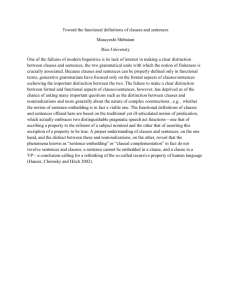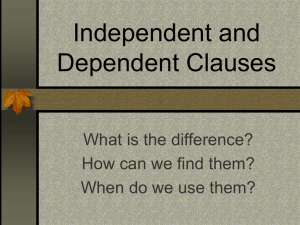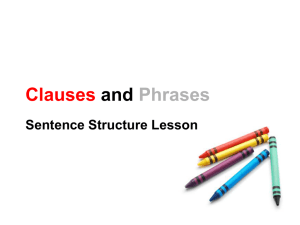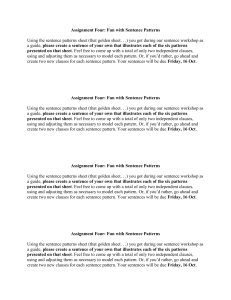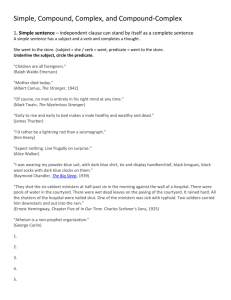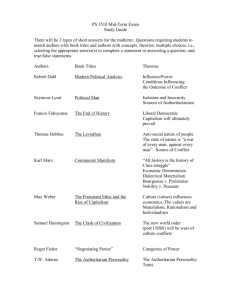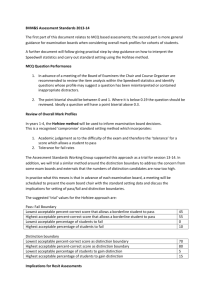Contracts - CER
advertisement
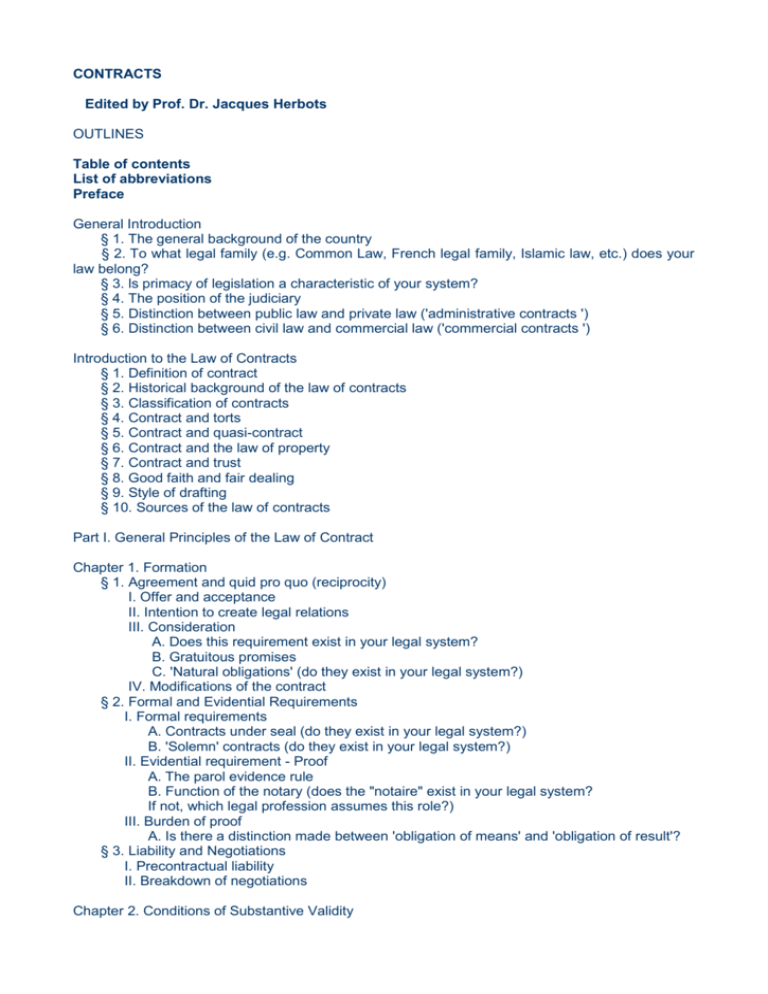
CONTRACTS
Edited by Prof. Dr. Jacques Herbots
OUTLINES
Table of contents
List of abbreviations
Preface
General Introduction
§ 1. The general background of the country
§ 2. To what legal family (e.g. Common Law, French legal family, Islamic law, etc.) does your
law belong?
§ 3. ls primacy of legislation a characteristic of your system?
§ 4. The position of the judiciary
§ 5. Distinction between public law and private law ('administrative contracts ')
§ 6. Distinction between civil law and commercial law ('commercial contracts ')
Introduction to the Law of Contracts
§ 1. Definition of contract
§ 2. Historical background of the law of contracts
§ 3. Classification of contracts
§ 4. Contract and torts
§ 5. Contract and quasi-contract
§ 6. Contract and the law of property
§ 7. Contract and trust
§ 8. Good faith and fair dealing
§ 9. Style of drafting
§ 10. Sources of the law of contracts
Part I. General Principles of the Law of Contract
Chapter 1. Formation
§ 1. Agreement and quid pro quo (reciprocity)
I. Offer and acceptance
II. Intention to create legal relations
III. Consideration
A. Does this requirement exist in your legal system?
B. Gratuitous promises
C. 'Natural obligations' (do they exist in your legal system?)
IV. Modifications of the contract
§ 2. Formal and Evidential Requirements
I. Formal requirements
A. Contracts under seal (do they exist in your legal system?)
B. 'Solemn' contracts (do they exist in your legal system?)
II. Evidential requirement - Proof
A. The parol evidence rule
B. Function of the notary (does the "notaire" exist in your legal system?
If not, which legal profession assumes this role?)
III. Burden of proof
A. Is there a distinction made between 'obligation of means' and 'obligation of result'?
§ 3. Liability and Negotiations
I. Precontractual liability
II. Breakdown of negotiations
Chapter 2. Conditions of Substantive Validity
§ 1.Capacity of the parties
§ 2. Defects of consent
I. Mistake (distinction from value; distinction from motive)
II. Misrepresentation
III. Improper pressure
IV. Gross disparity
§ 3. Other conditions of validity
I. Existing and licit cause
II. Determined or determinable, possible and licit object (if this concept exists in your legal
system)
III. Initial impossibility
IV. Illegality and public policy
V. Unenforceable contracts
§ 4. The consequences of a defect of consent or a lack of substantive validity
I. Avoidance of the contract. Nullity
II. Retroactive effect of avoidance or nullity
III. Damages
Chapter 3. The Contents of a Contract
§ 1. The different clauses
I. Ascertaining of express terms
II. Implied terms
III. Standard terms and exemption clauses
IV. Penalty clauses
V. Arbitration clauses
§ 2. Interpretation
§ 3. Conditional contracts
Chapter 4. Privity of Contract
§ 1. The rule of privity of contract
I. Third parties and the contract
II. Contract for the benefit of a third party
§ 2. Transfer of contractual rights
§ 3. The special case of a 'sub-contract', e.g. the (nominated) subcontractor in building
contracts
§ 4. Actio pauliana (if this remedy exists in your legal system)
Chapter 5. The Termination of the Contract
§ 1. Performance and breach
§ 2. Impossibility, frustration and hardship: 'the unforeseen'
§ 3. Discharge by agreement
Chapter 6. Remedies
§ 1. General provisions
§ 2. Specific performance and injunctions Astreinte
§ 3. Termination
§ 4. Exceptio non adimpleti contractus (the defence of non- performance by the other party)
§ 5. Faulty behaviour of the debtor
§ 6. Limitation of actions
§ 7. Damages and exemption clauses
§ 8. Restitution
Part II. Specific Contracts
Chapter 1. Agency
Chapter 2. Bailment
Chapter 3. Gaming and wagering
Chapter 4. Sale of goods
Chapter 5. Building contracts, hire of work & skills
Chapter 6. Lease, commercial and agricultural leases
Chapter 7. Compromise settlement
Chapter 8. Suretyship
Chapter 9. Pledge
Chapter 10. Loans
Chapter 11. Contracts with the government and other public administrations
Chapter 12. Contract of partnership
Chapter 13.Quasi-contracts:
§ 1. Negotiorum gestio
§ 2. Enrichment without cause (cause: justification for an enrichment)
§ 3. Money paid but not due
Selected Bibliography
Index
